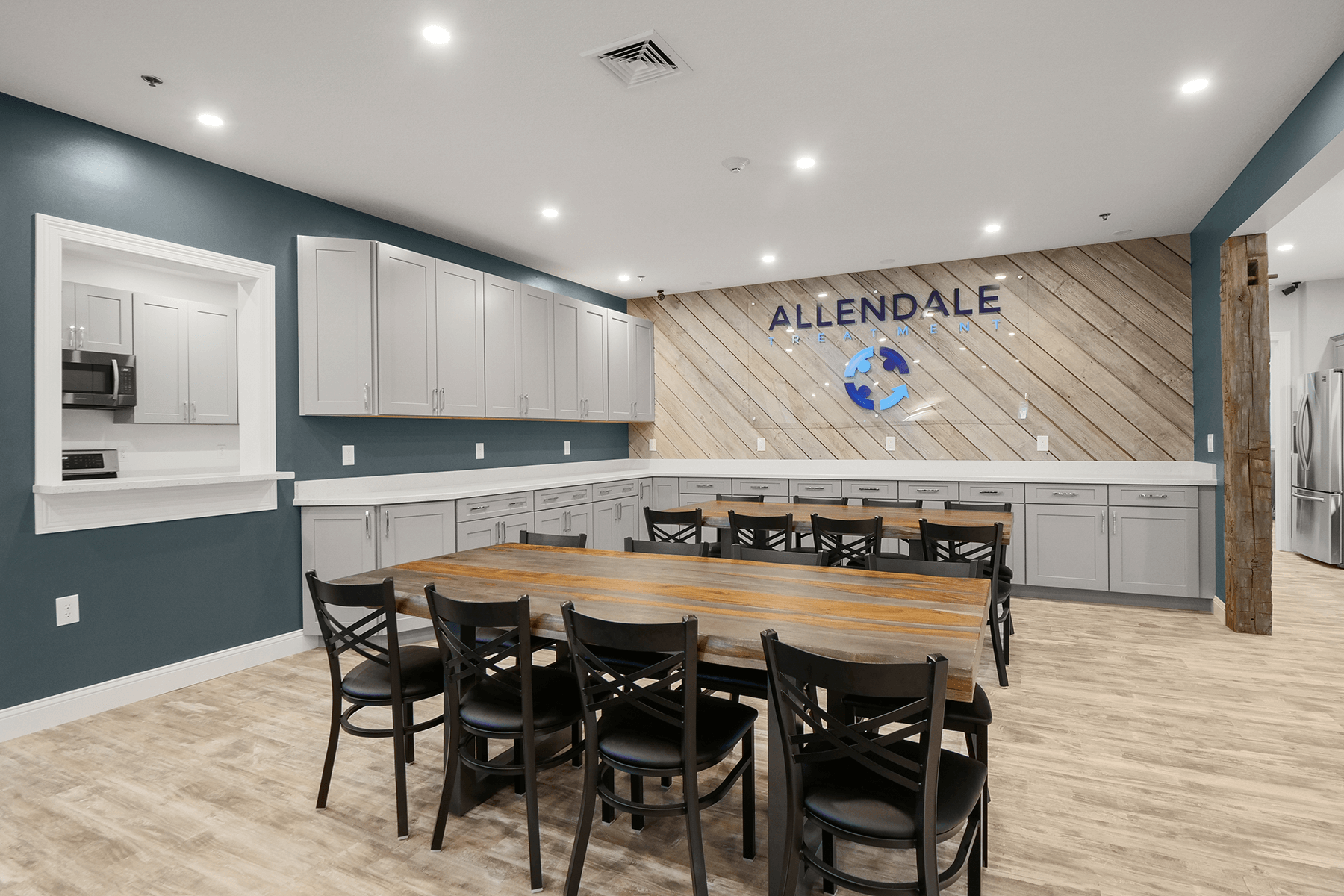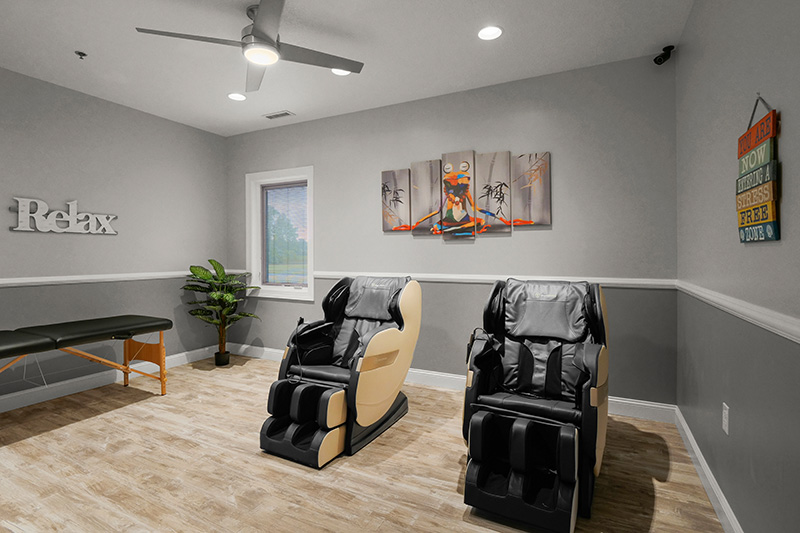Get Treatment for Your Anxiety in Fort Wayne, IN
Get Treatment for Your Anxiety in Fort Wayne, IN
At Allendale Treatment, we treat ANXIETY disorders from a trauma perspective.
An anxiety disorder is when someone has frequent feelings of intense, excessive, or persistent fear or worry for daily situations. In many cases, anxiety disorders involve repeated episodes of intense feelings of fear, terror, or anxiety that can peak within minutes, widely known as panic attacks.
Anxiety disorders are usually hard to control, interfere with daily activities, and can last for a long time.
These unfortunate side effects are some of the focal points here at Allendale Treatment, and we aim to help understand these kinds of behaviors to help the individual suffering from any of these disorders.
833-338-6946
Call 24/7/365 to Speak With an Admissions Counselor
Where to Find Us:
5419 Co Rd 427
Auburn, IN 46706
310 E Dupont Rd Suite #2
Fort Wayne, IN 46825
Seeking Professional Treatment for Anxiety Disorder
Anxiety disorders are usually found alongside other disorders. Because of this, they have a high comorbidity rate, which is when a person experiences two or more illnesses at the same time. As damaging as one disorder can be, comorbid disorders can be detrimental to anyone, and finding the correct treatment can be crucial.
Since so many adults struggle with anxiety disorders every day, it is important to get treatment, but some adults can be a little more hesitant when it comes to topics of mental health. This does not need to hinder an adult’s ability to find help, though.
The first step would be to talk with your trusted physician for a diagnosis or for treatment if symptoms have been previously established. Talking with a trusted physician can result in adults having greater chances of accepting treatment or a referral to a mental health professional like Allendale Treatment.

Common Anxiety Disorders
Generalized Anxiety Disorder
-Causes: Family history of anxiety, prolonged or recent exposure to stressful situations (including family or personal illnesses), excessive use of caffeine or tobacco which can worsen existing anxiety, childhood abuse or bullying
-Symptoms: Difficulty controlling feelings of worry, muscle tension, irritability, difficulty concentrating, easily fatiguing, feeling restless or wound up
-Treatment: Psychotherapy or medication
Generalized anxiety disorder (with or without agoraphobia) is typically one of the top two anxiety disorders that is consistently associated with substance use disorders.
Obsessive Compulsive Disorder
-Causes: Genetic and hereditary factors, repetitive and habitual learned behaviors that become associated with anxiety relief
-Symptoms: Irrational fear of disorder or dirtiness, compulsive behavior, agitation, hyper-vigilance, impulsivity, ritualistic behavior, apprehension, repetition of own words
-Treatment: Therapy (cognitive behavior therapy, rational emotive behavior therapy, aversion therapy, support group), medication
Obsessive compulsive disorder is a relatively common underlying disorder with substance abuse disorder patients. Substance abuse disorders may become more noticeable than the symptoms of OCD, which is why the two disorders co-occurring. It has been estimated that close to 30% of people who have obsessive compulsive disorder had a substance abuse disorder at one point during their life.
Generalized Anxiety Disorder
-Causes: Family history of anxiety, prolonged or recent exposure to stressful situations (including family or personal illnesses), excessive use of caffeine or tobacco which can worsen existing anxiety, childhood abuse or bullying
-Symptoms: Difficulty controlling feelings of worry, muscle tension, irritability, difficulty concentrating, easily fatiguing, feeling restless or wound up
-Treatment: Psychotherapy or medication
Generalized anxiety disorder (with or without agoraphobia) is typically one of the top two anxiety disorders that is consistently associated with substance use disorders.
Obsessive Compulsive Disorder (OCD)
-Causes: Genetic and hereditary factors, repetitive and habitual learned behaviors that become associated with anxiety relief
-Symptoms: Irrational fear of disorder or dirtiness, compulsive behavior, agitation, hypervigilance, impulsivity, ritualistic behavior, apprehension, repetition of own words
-Treatment: Therapy (cognitive behavior therapy, rational emotive behavior therapy, aversion therapy, support group), medication
Obsessive compulsive disorder is a relatively common underlying disorder with substance abuse disorder patients. Substance abuse disorders may become more noticeable than the symptoms of OCD, which is why the two disorders co-occurring. It has been estimated that close to 30% of people who have obsessive compulsive disorder had a substance abuse disorder at one point during their life.
Panic Disorder (OCD)
-Causes: Genetic or hereditary factors, experiencing a traumatic or stressful life event (loss of a family member, events leading to grief or bereavement)
-Symptoms: Racing or pounding heart, sense of impending doom or danger, chills, sweating, shortness of breath, trembling, fear of loss of control or death
-Treatment: psychotherapy, medication
People who experience panic disorder have been known to use drugs or alcohol to calm their nerves or numb their fears. Addicts can become dependent on these substances that only worsen their condition and give them a higher chance for panic attacks.
Post Traumatic Stress Disorder (PTSD)
-Causes: Experiencing a serious accident, experiencing any form of abuse, exposure to traumatic events (war, losing a child, physical or sexual assault)
-Symptoms: Hypervigilance, irritability or hostility, insomnia or nightmares, social isolation, emotional detachment, severe anxiety, flashbacks, guilt, unwanted memories of trauma
-Treatment: psychotherapy (trauma-focused), medication
PTSD changes one’s brain chemistry just like a substance abuse disorder does. Following a traumatic experience, the brain can begin to create less endorphins, the chemical that plays a part in making us happy. The US Department of Veteran Affairs states that “nearly three-quarters of people surviving abuse or violent trauma report alcohol abuse disorder.”
People experiencing PTSD may have harsh outbursts in public, and this may lead the person who is suffering from the disorder to feel guilty. This guilt can lead them to further self-medicate with drugs and alcohol.
Social Phobia (or Social Anxiety Disorder)
-Causes: Genetic or hereditary factors, negative experiences, having a condition of appearance that could draw attention
-Symptoms: Avoiding situations in which you may be judged, worry about embarrassment, fear of talking to or interacting with strangers, fearing others will notice your anxiety
-Treatment: psychotherapy, medication
Social anxiety disorders (SAD) affect 15 million people a year in America, and close to 36% of that group goes ten or more years before they start getting help. Someone with a social anxiety disorder is at a far higher risk of developing substance abuse disorders to try and feel more relaxed, calm, or confident while they are in a social setting. These substances can become crutches, and they can heighten social fears and make people more reclusive than before.

Substance-Induced Anxiety
One of the most common causes for heightened anxiety could be the use of drugs or alcohol. Anxiety can even stem from someone quitting a drug. Regardless, someone could experience restlessness, panic, or nervousness from substance-induced anxiety, and symptoms can worsen while the drug dependency deepens.
Many drugs can cause anxiety while someone is under the influence of the substance. Some of the most common drugs that can spur on substance-induced anxiety are alcohol or illicit drugs like cocaine and LSD. Even nonprescription drugs like caffeine or decongestants can increase feelings of anxiety.
A common diagnosis usually involves a healthcare provider asking you how often you use a substance. These can be illegal, prescription, or nonprescription drugs. The healthcare provider will also ask about any symptoms you have been experiencing, your medical history, and they may even give you a physical exam or need further tests or scans done. Once the baseline information is established, the healthcare provider can move on and see which kind of treatment seems best for you.
One of the most important things for someone experiencing substance-induced anxiety is that they receive a dual-diagnosis, which is one of the specialties here at Allendale Treatment. Detox and drug rehab have repeatedly shown that they can help with the addiction factors, and the long list of mental health professionals that are available can help you safely understand, overcome, and address many co-occurring mental illnesses that are so often connected with substance use.










